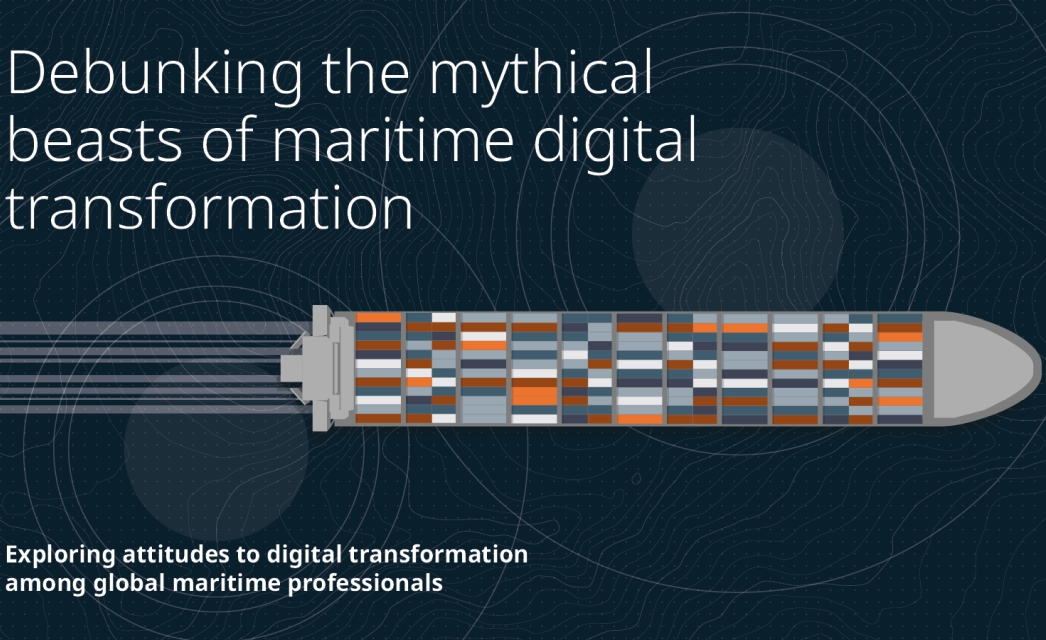Despite 78 per cent of industry professionals agreeing that change and technological innovation is a positive thing for the maritime industry, almost half (45 per cent) admit to having a volatile attitude towards technology. Over a third (36 per cent) say they are actively resistant to change. This follows from a new Wärtsilä report.
The report, called “Debunking the Mythical Beasts of Maritime Digital Transformation”, also reveals that as many as eighteen per cent do not think that the industry is unified in its understanding of digitalisation and why it is needed.
‘This report makes clear that the industry agrees that digitalisation is essential to the future of shipping,’ says Michael Christiansen, Vice President, Smart Vessel, Wärtsilä. ‘But little tangible progress has been made to date because of wildly different and vague interpretations of what digitisation actually means. What’s interesting is that our report draws striking parallels between the fears and misunderstandings that gave rise to vivid stories of famous mythological sea monsters that live on in folklore today and highlights the apprehension that many modern-day maritime professionals feel towards the largely unchartered ocean of digital transformation.’
The research shines a light on these fears and misunderstandings, with over two thirds (68 per cent) of industry professionals believing that the ability to digitalise existing infrastructure and retrofit vessels is challenging. In addition, over half (56 per cent) agree that the time and cost implications involved with digital transformation projects are too high. On top of that, 63 per cent believe that there is a lack of skills and knowledge among seafarers to fulfil the requirements of new technologies.
Also read: Wärtsilä and Hycamite to produce hydrogen from LNG on ships
Collaboration and people crucial
But on the positive side, the research also highlights a way forward. It revealed that seventy per cent of industry professionals have a very clear understanding of why digitalisation is needed and its benefits, but 69 per cent believe greater collaboration between industry players could be improved. 88 per cent agree that this will be key to making digital transformation a reality.
Significantly, 64 per cent of respondents recognise that people are more crucial to digital transformation than technology, therefore without buy-in from a larger proportion of maritime industry professionals from the outset, successful digital transformation will not be possible.
Christiansen continues: ‘Like the sea, digital transformation is a great unifier. We are all in the same boat. Real progress will only happen when we collectively abandon the idea of digital transformation as all or nothing. As each organisation within the maritime industry will be at a different stage of its own journey, we must appreciate it as an iterative and stepwise process. There is still much work to be done to bridge the gaps – break the silos – between digital systems.’
He adds: ‘To do this, we can and must share and learn from each other’s experiences because digitisation won’t be achieved by any one player alone. We need to work together to build an ecosystem where digital technologies on board a ship talk to those in offices on shore. This is how, as an industry, we can reframe the route to digitalisation and turn threats into opportunities.’
Also read: Wärtsilä launches engine ready for carbon-free fuels
About the Wärtsilä report
Wärtsilä’s “Debunking Maritime Myths of Digital Transformation” report explores attitudes to digital transformation among maritime professionals across Europe, the Middle East, the US, and the Asia-Pacific region. The report outlines a vision for a connected ecosystem from ship to shore – and beyond; a maritime ecosystem that can deliver improved efficiencies, better safety and compliance, and greater sustainability for all.
Also read: Meriaura and Wärtsilä plan to order project cargo vessel sailing on green ammonia








